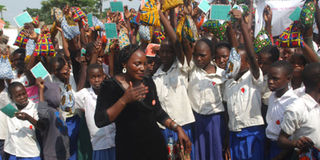Shs21m for pads to counter rate of dropouts in Pallisa

Pupils from Agule Primary School show bags containing the re-usable sanitary pads they recieved from MoonCatcher a US based Non Governmental Organisation recently. PHOTO BY MUDANGHA KOLYANGHA
“There are many reasons behind the dropout rates of the girl-child among which is early marriage but also lack of basic needs such as sanitary pads to make the menstrual days easier.” These were the words of Agnes Fibe Kanabi, the country director, Mooncatcher, while handing over re-usable sanitary pads worth Shs21m to more than 1,000 pupils from different schools in Agule Sub-county, Pallisa District.
During celebrations to mark international menstrual hygiene day, Kanabi explained that the prime objective of the programme is to change the lives of girls through menstrual management in order to keep these children in schools.
Mooncatcher, a US-based non-government organisation, operates the project in 22 countries including Uganda where they are partnering with Woman of Purpose, a community-based organisation in Pallisa.
No shame
“Girls need to feel comfortable while at school because there was a tendency of boys laughing at them while having their period causing them to shun school. We need to change that attitude. Boys should be the ambassadors to teach others that having a period is healthy,” Kanabi says.
She, however, challenged teachers to take the lead in urging boys to understand the situation of girls. Teachers should for instance encourage pupils to write an essay related to menstruation so that they understand.
Emmanuel Omauk, the coordinator Woman of Purpose, said these pads were given to adolescent girls from 11 primary schools of Nyaguo, Pasia, Bo Grace, Agule, Chelekura, Odusai, Agule while Agule High School, Landmark SS, each received a kit of reusable menstrual sanitary pads.
“Majority of our parents pay little attention to their girl-child in terms of provision of basic needs such as sanitary pads and even education. They believe the girl child is a source of wealth through marrying them off at tender age in exchange for money,” he explained.
The girls were also trained in hygiene, use of sanitary pads as well as discipline.
“We are giving back to the community and also acknowledge in detail the role of the girl child in the development of this country. Educating the girl child is educating a nation. We need to come together and support these children while at school,” he explained.
Annet Atuke, a senior teacher at Pasia Primary School, applauded Mooncatcher for the timely intervention. “This is commendable. The support will motivate these girls to keep in schools,” she said. Adding that: “Previously talking about menstruation in the presence of men was a taboo but people [parents] have now been sensitised. They are free to discuss it and also share the knowledge with their children because there are some who are too shy to inform their parents.”
Other interventions
In 2017, gender activist and Makerere University researcher, Dr Stella Nyanzi, started the Pads4GirlsUg campaign to advocate for school-going girls to be given free sanitary towels. She used her Facebook page to collect donations of sanitary towels.
The cause has however been shelved. In 2008, Dr Moses Kizza Musaazi of Makerere University come up with a way to make affordable sanitary pads from papyrus reeds which are now widely on the market. Dr Musaazi now helps girls and women in refugee camps in Kyaka II Refugee Settlement (Kyegegwa District) produce MakaPads all of which are bought by UNHCR for distribution to all refugee women and girls throughout Uganda.




